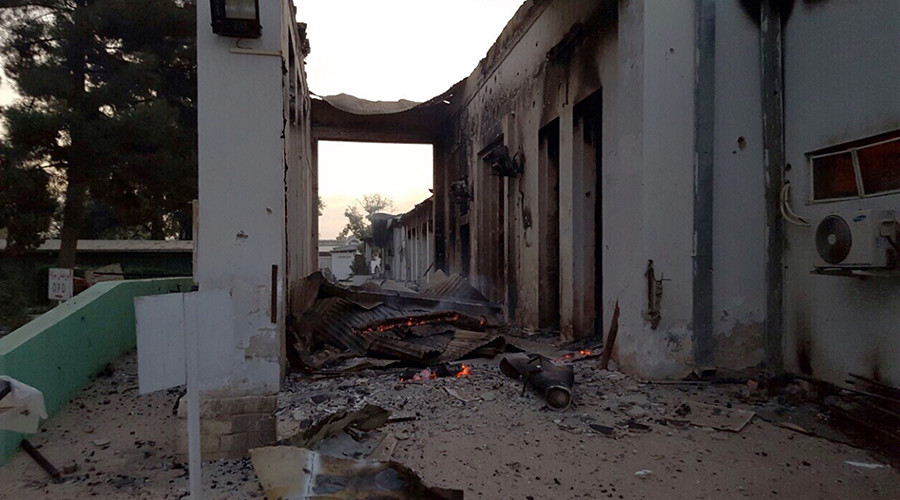Afghanistan Minister Justifies Strike On MSF Hospital
MSF hospital facility destroyed
NEW DELHI: Afghanistan’s acting Defence Minister, Masoom Stanekzai, justified a military strike on a hospital facility run by Médecins Sans Frontières (Doctors Without Borders) that killed 12 staff and 10 patients in the war torn city of Kunduz.
Stanekzai told The Associated Press in an interview that Taliban insurgents were using the facility as a “safe place.” Stanekzai said a Taliban flag had been hoisted on the walls around the hospital compound. "That was a place they wanted to use as a safe place because everybody knows that our security forces and international security forces were very careful not to do anything with a hospital," Stanekzai said. "But when there was on one of the walls of the hospital, there was a Taliban flag -- what can you think?"
"I am saying the compound was being used by people who were fighting there, whether it was Taliban or ISI or whoever they were," he said.
Kate Stegeman, MSF's communications director in Afghanistan reiterated that no armed combatants were in the hospital at any time, with MSF staff providing much needed medical care to victims of war in Kunduz -- as Taliban militants captured the city. "We reiterate that every staff member in Kunduz working for MSF has repeatedly reported to us that there were no armed people in the hospital at the time of the bombing,” Stegeman said.
Meanwhile, MSF demanded a clear explanation for the strike, claiming that the attack was deliberate. “The hospital was repeatedly hit both at the front and the rear and extensively destroyed and damaged, even though we have provided all the coordinates and all the right information to all the parties in the conflict," Christopher Stokes, general director MSF (Médicins Sans Frontiéres) told AP.
"The extensive, quite precise destruction of this hospital ... doesn't indicate a mistake. The hospital was repeatedly hit," he pointed out.
The US, whose planes carried out the attack, has offered no clear explanation. Two weeks ago, US commander General John Campbell conceded that the strike was called by US special operations forces and not their Afghan allies, as previously alleged.
Before that, Campbell had given a different version of events. The General said that Afghan forces had requested US air cover after being engaged in a “tenacious fight” to retake the northern city of Kunduz from the Taliban.
Campbell changed the story a few days later saying that Afghan forces had not directly communicated with the US pilots of an AC-130 gunship overhead.
Then a day later, Campbell told the Senate armed services committee that “Even though the Afghans request that support, it still has to go through a rigorous US procedure to enable fires to go on the ground. We had a special operations unit that was in close vicinity that was talking to the aircraft that delivered those fires.”
MSF has denounced Campbell’s press conference as an attempt to shift blame to the Afghans. “The US military remains responsible for the targets it hits, even though it is part of a coalition,” said MSF Director General Christopher Stokes.
"On behalf of the American people, I extend my deepest condolences to the medical professionals and other civilians killed and injured in the tragic incident at a Doctors Without Borders hospital in Kunduz," Obama said in a statement released by the White House.
"The Department of Defense has launched a full investigation, and we will await the results of that inquiry before making a definitive judgment as to the circumstances of this tragedy. We will continue to work closely with President [Ashraf] Ghani, the Afghan government and our international partners to support the Afghan National Defense and Security forces as they work to secure their country," the statement said.
The UN called the strikes "inexcusable and possibly even criminal" with Secretary General Ban Ki Moon promising a thorough investigation. "International and Afghan military planners have an obligation to respect and protect civilians at all times, and medical facilities and personnel are the object of a special protection," said UN High Commissioner Ra'ad Al Hussein Zeid.
MSF responded to the incident by condemning the suspected US bombing as “horrific.” MSF president Meinie Nicolai described the incident as "abhorrent and a grave violation of international humanitarian law.”
"All indications currently point to the bombing being carried out by international Coalition forces," MSF said. The charity further added that US and Afghan forces had been provided exact coordinates of the hospital facility -- which was bombed overnight in strikes that lasted over an hour.
“MSF wishes to clarify that all parties to the conflict, including in Kabul and Washington, were clearly informed of the precise location (GPS Coordinates) of the MSF facilities in Kunduz, including the hospital,” MSF stated.
Further, the organisation added that the strikes appeared to continue even after MSF contacted US forces. “The bombing in Kunduz continued for more than 30 minutes after American and Afghan military officials in Kabul and Washington were first informed by MSF that its hospital was struck,” MSF said.
What exactly happened and why? There is no clear answer.





